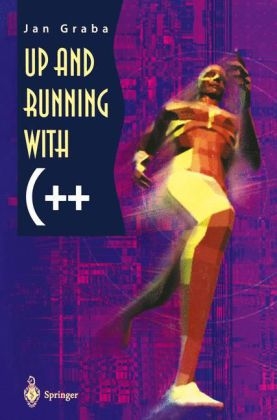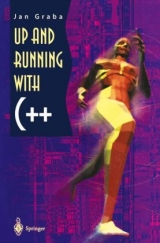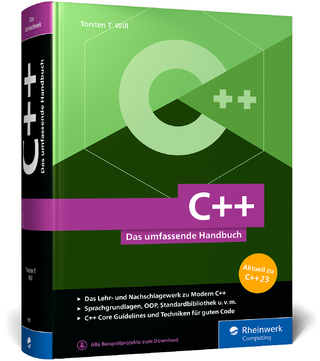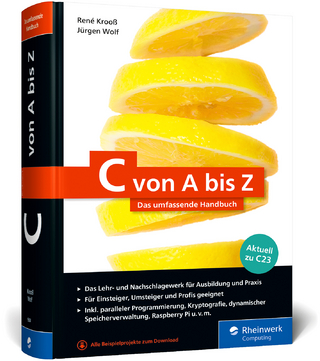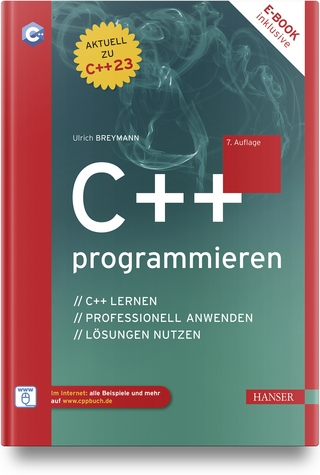Up and Running with C++
The author is a senior lecturer at SheffieldHallam University in the UK and previously published a book on C++ with us.
1 The Fundamentals of Object Orientation.- 1.1 Brief Background.- 1.2 Basic Concepts and Terminology.- 1.3 The Motivation for a New Approach.- 1.4 Why OOP?.- 1.5 The Next Few Chapters.- 2 First Steps in C++ Programming.- 2.1 The Basic Structure of a C++ Program.- 2.2 Basic Data Types and Variable Declarations.- 2.3 Type Conversions.- 2.4 Constants.- 2.5 Standard Input and Formatted Output.- 2.6 Enumerated Types.- 2.7 The Scope of a Variable.- 2.8 The Lifetime of a Variable.- 2.9 Common Operators.- Exercises.- 3 Selections and Iterations.- 3.1 The Relational Operators.- 3.2 Selection Statements.- 3.3 Iterations.- 3.4 The Use of break and continue.- 3.5 The Logical Operators.- Exercises.- 4 Functions and Header Files.- 4.1 Functions.- 4.2 Linkage 34.- 4.3 Non-System Header Files.- 4.4 The Multiple Inclusion Problem.- 4.5 Function Overloading.- 4.6 Default Arguments.- Exercises.- 5 Arrays, Pointers and References.- 5.1 Structured Types.- 5.2 Array Declaration and Usage.- 5.3 Array Initialisation.- 5.4 Array Processing.- 5.5 Strings.- 5.6 Pointers.- 5.7 Pointers and Arguments.- 5.8 Arrays and Pointers.- 5.9 The NULL Pointer.- 5.10 Strings Revisited.- 5.11 Functions for String Processing.- 5.12 Memory Allocation for Strings.- 5.13 Reference Types.- 5.14 References as Arguments.- Exercises.- 6 Adding Sophistication to Basic I/O.- 6.1 Handling 'Whitespace' in Text Input.- 6.2 The Formatting of Output Via Manipulators.- Exercises.- 7 Classes in C++.- 7.1 Structures.- 7.2 Explicit Class Declarations.- 7.3 Access Control.- 7.4 Member Function Definitions.- 7.5 Using a Class.- 7.6 Inline Member Functions.- 7.7 Constructors.- 7.8 Destructors.- 7.9 Arrays of Objects.- 7.10 Objects Within Objects.- 7.11 The this Pointer.- 7.12 Static Class Members.- Exercises.- 8 Dynamic MemoryManagement.- 8.1 Introduction.- 8.2 new and delete.- 8.3 Dynamic Memory Usage with Classes.- 8.4 Dynamic Data Structures.- 8.5 Dynamic Arrays of Objects.- 8.6 Dynamic Instance Variables.- Exercises.- 9 Inheritance.- 9.1 Inheritance in the Context of Object Orientation.- 9.2 Inheritance in C++.- 9.3 Designing a Class Hierarchy.- Exercises.- 10 Polymorphism.- 10.1 Polymorphism in the Context of Object Orientation.- 10.2 The Assignment Compatibility Rule Revisited.- 10.3 Function Binding.- 10.4 Virtual Functions.- 10.5 Constructors and Destructors.- 10.6 Pure Virtual Functions and Abstract Base Classes.- 10.7 Heterogeneous Linked Lists.- Exercises.- 11 Friend Functions and Operator Functions.- 11.1 Access Problems.- 11.2 Friend Functions.- 11.3 Operator Functions and Operator Overloading.- Exercises.- 12 File Handling.- 12.1 File Streams.- 12.2 Opening and Closing Files.- 12.3 Writing and Reading Lines To/From a Text File.- 12.4 Character-Level I/O.- 12.5 cin and cout as Files.- 12.6 Using Command Line Parameters.- 12.7 Random Access.- Exercises.- 13 Templates.- 13.1 Introduction.- 13.2 Template Functions ('Generic Functions').- 13.3 Parameterised Types ('Generic Types').- Exercises.- Appendix A Exception Handling.- Appendix B Platform Variations.- B.1 Borland C++.- B. 1.1 Creating and Running a Program.- B.1.2 Single-key Input.- B.1.3 Screen-Handling.- B.2 Unix Implementations.- B.2.1 Compiling and Running a Program.- B.2.2 Unix Screen-Handling.- Appendix C Stream Formatting.- Model Solutions to Programming Exercises.
| Erscheint lt. Verlag | 18.3.1998 |
|---|---|
| Zusatzinfo | IX, 304 p. |
| Sprache | englisch |
| Gewicht | 492 g |
| Themenwelt | Informatik ► Programmiersprachen / -werkzeuge ► C / C++ |
| Schlagworte | C++ (Programmiersprache) • C++ Programming • C programming language • C++ programming language • Programming language • selection • Templates |
| ISBN-10 | 3-540-76234-5 / 3540762345 |
| ISBN-13 | 978-3-540-76234-8 / 9783540762348 |
| Zustand | Neuware |
| Informationen gemäß Produktsicherheitsverordnung (GPSR) | |
| Haben Sie eine Frage zum Produkt? |
aus dem Bereich
